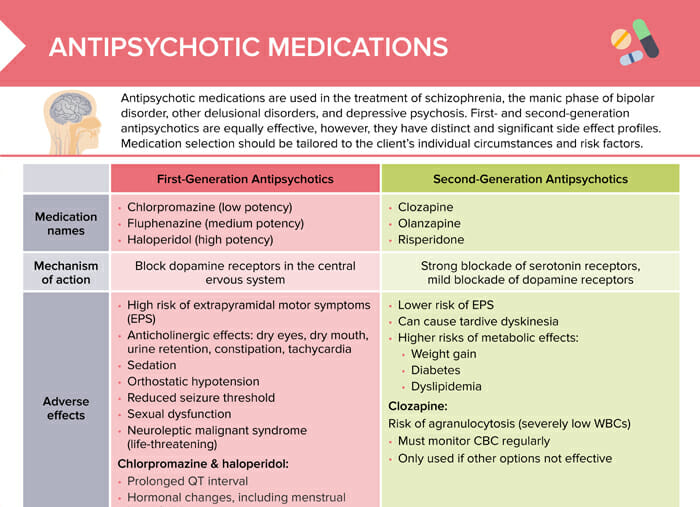What are antipsychotics?
Antipsychotic medications are used in the treatment of schizophrenia, the manic phase of bipolar disorder, other delusional disorders, and depressive psychosis. First- and second-generation antipsychotics are equally effective, however, they have distinct and significant side effect profiles. Medication selection should be tailored to the client’s individual circumstances and risk factors.
How do antipsychotics work?
Typical, or first-generation, antipsychotics work by blocking the dopamine receptors in the CNS.
Atypical, or second-generation, antipsychotics work by strongly blocking serotonin receptors and mildly blocking the dopamine receptors.
Antipsychotics therefore follow the dopamine hypothesis (belief that psychosis is related to overactivity of dopamine in certain brain pathways), blocking dopamine receptors and helping to restore a neurotransmitter activity balance, reducing psychotic symptoms.
Antipsychotic medications adverse effects and contraindications
First-generation antipsychotics side effects
- High risk of extrapyramidal motor symptoms (EPS)
- Anticholinergic effects: dry eyes, dry mouth, urine retention, constipation, tachycardia
- Sedation
- Orthostatic hypotension
- Reduced seizure threshold
- Sexual dysfunction
- Neuroleptic malignant syndrome (life-threatening)
Haloperidol side effects
Chlorpromazine and haloperidol especially can have the adverse effects of a prolonged QT interval and hormonal changes (including menstrual irregularities).
Second-generation antipsychotics side effects
- Atypical antipsychotics generally have a lower risk of extrapyramidal motor symptoms.
- Can cause tardive dyskinesia
Higher risks of metabolic effects:
- Weight gain
- Diabetes
- Dyslipidemia
- Clozapine specifically has a risk of agranulocytosis (severely low WBCs), so is only used if other options are not effective, and regular monitoring CBC is mandatory.
Why do antipsychotics cause weight gain?
Antipsychotics can cause weight gain due to several mechanisms that different types of them have to different degrees:
- Blocking histamine H1 receptors or serotonin 5-HT2C receptors can increase appetite.
- Increasing prolactin levels might contribute to weight gain.
- Antipsychotics may affect glucose metabolism and insulin resistance, leading to increased fat storage.
- Sedation or decreased motivation due to the medication can reduce physical activity.
- Emerging research suggests antipsychotics might change gut bacteria composition, potentially influencing weight.
Why do antipsychotics cause death in dementia patients?
Antipsychotics, especially when used in elderly patients with dementia, have been associated with an increased risk of mortality. The exact reasons aren’t entirely clear, but several factors are thought to contribute:
- Adverse effect of QT interval prolongation leading to fatal arrhythmias and increasing stroke risk
- Sedation could lead to aspiration/pneumonia, as well as falls/injury
- Metabolic effects
- Neurological effects of the medications may worsen or interact with dementia
Typical vs atypical antipsychotics
“Typical” and “atypical” are different ways of referring to first- and second-generation antipsychotics, respectively.
List of common antipsychotics
Common first-generation antipsychotics
- Chlorpromazine (low potency)
- Fluphenazine (medium potency)
- Haloperidol (high potency)
Common second-generation antipsychotics
- Clozapine
- Olanzapine
- Risperidone
Client education: common questions about antipsychotics
What happens if you take antipsychotics and don’t need them?
Because mental health conditions can be hard to pin down, some clients who get a prescription for antipsychotics might be worried about what antipsychotics do to a “normal person” who actually does not have an indication for them.
All the known adverse effects of the medications can affect everyone who takes them.
The main mechanism of action of antipsychotics, blocking dopamine receptors, may lead to symptoms similar to Parkinson disease or tardive dyskinesia due to the reduced dopamine activity, in people with previously normal dopamine levels.
Furthermore, the person might experience cognitive dulling or decreased motivation, as well as potentially becoming dependent on the drug.
How to reverse weight gain from antipsychotics
While the strategies for weight loss are the same for weight gain caused by antipsychotic medications, if the client is still taking them, there are additional considerations:
- Ongoing treatment with antipsychotics may make weight management harder due to metabolic changes and appetite changes/sedative effects.
- Mind weight loss medications for potential drug–drug interactions.
- Weight gain due to medication should be addressed with the psychiatrist or primary care physician for the option of switching to a different medication.
How to heal the brain after antipsychotics
Strategies that can support the brain in recovering from prolonged treatment with antipsychotics include:
- Tapering: Patients should strictly follow tapering regimen and only stop medications after consulting their healthcare provider.
- Brain-healthy lifestyle: Exercise, a balanced diet rich in omega-3 fatty acids, cognitive training and mindfulness, as well as good sleep and social connections or support groups can all enhance and support the brain.
Which neurotransmitter is affected by antipsychotic medications?
Antipsychotics block the dopamine receptors in the brain, reducing this neurotransmitter’s activity.

